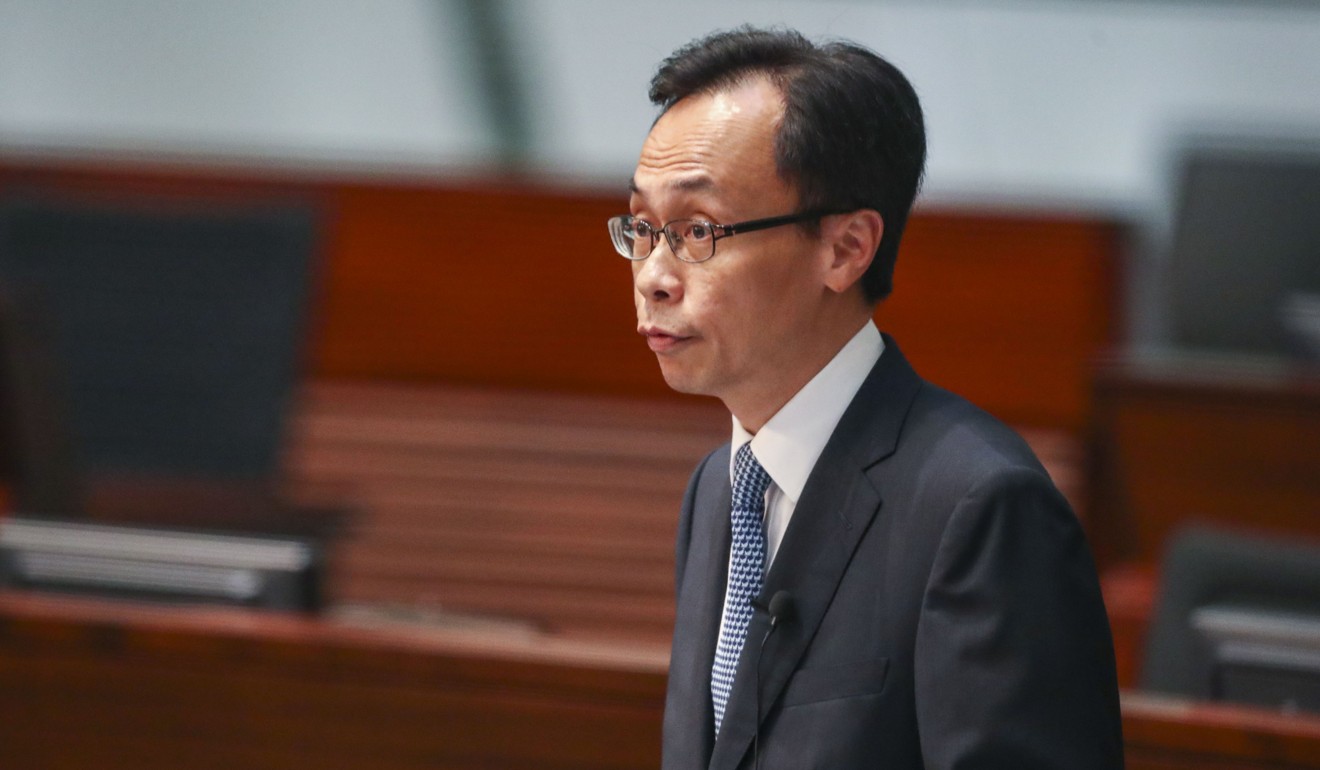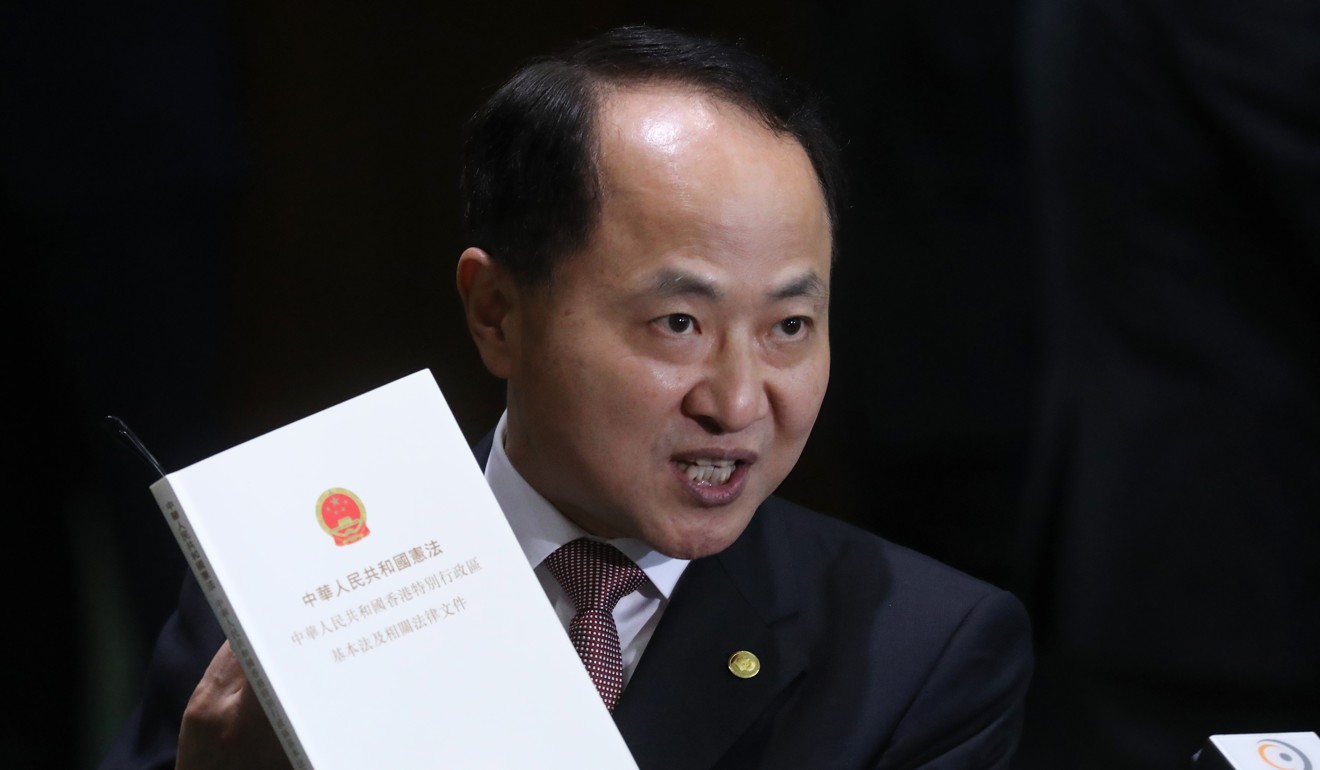
Chinese constitution applies to gaps in Hong Kong’s Basic Law, minister Patrick Nip says in talk about calls for end to ‘one-party dictatorship’
City’s secretary for constitutional and mainland affairs makes remark during discussion over whether those who call for change should be stopped from standing for election
The Chinese constitution applies to Hong Kong when there is a gap in the city’s Basic Law, a senior official told lawmakers on Wednesday.
Secretary for Constitutional and Mainland Affairs Patrick Nip Tak-kuen made the remark when asked whether calling for the end of one-party rule in China was “unconstitutional”.
Nip was responding to HK First lawmaker Claudia Mo Man-ching over the eligibility of people who have chanted “end to one-party dictatorship” to stand as candidates in council elections.

Wang was one of the mainland and Hong Kong political heavyweights to have made similar comments, after the national constitution was amended in March to say the leadership of the Communist Party was “the most essential feature of socialism with Chinese characteristics”.
While Nip refused to give Mo a straight answer, he said politicians in Hong Kong must uphold the Basic Law and respect the Chinese constitution and the country’s political system.
Hong Kong’s world won’t stop in 2047, so we’d better start building bridges
“Returning officers must, based on the specific circumstances of each case, decide whether or not a person intending to run in the election is validly nominated as a candidate,” he said.
The comments came ahead of two important elections in Hong Kong – next year’s District Council race, and the Legislative Council polls in 2020.

In a follow-up question, Starry Lee Wai-king, chairwoman of the Democratic Alliance for the Betterment and Progress of Hong Kong, pressed Nip to say if the act of chanting the slogan was against the Basic Law and the Chinese constitution.
“If relevant policies and systems are stipulated in the Basic Law, we do it according to the Basic Law. If it is outside of those areas, the country’s constitution also applies,” Nip said.
As it is stated in the Basic Law that Hong Kong should have a capitalist system, he said the provisions on the socialist system, and policies in the Chinese constitution, did not apply in the city.
Can Beijing’s power to interpret Hong Kong’s Basic Law ever be questioned?
He did not elaborate, however, on Hong Kong issues in which the country’s constitution would apply.
A similar comment was made earlier by deputy director of the Basic Law Committee Elsie Leung Oi-sie, who said all provisions of the Chinese constitution, except those about the socialist system, were applicable to Hong Kong.
She also said the city’s government should study how the constitution could be applied locally.
Civic Party lawmaker Dennis Kwok, representing the legal sector, said the Basic Law had already been comprehensively drafted, and touched upon almost all issues ranging from the political and economic system to human rights and the rule of law.
He said he believed Nip was referring to areas related to defence and foreign affairs, which were not covered by the mini-constitution.
Executive Council member Ronny Tong Ka-wah agreed that the Chinese constitution can be applied to Hong Kong, but said such occasions were rare.
“I believe there are very few issues where the county’s constitution is applicable to Hong Kong, even if it is applicable, such issues will not be too important,” Tong said.
Major issues, such as the city’s political structure, economic development, and judiciary independence are already covered by the Basic Law, he said.
While he said the slogan was against the Chinese constitution “in theory”, Tong added that freedom of speech in the city was also protected by the Basic Law.
China imposes national anthem law on Hong Kong, raising spectre of prison terms for abuse of song
Pro-Beijing lawmaker Priscilla Leung Mei-fun, a law academic from City University, said the Chinese constitution enjoyed a higher status than the Basic Law and was applicable to the whole country, including Hong Kong and Macau.
“But as there is the Basic Law … even though the constitution in general applies to Hong Kong, those clauses which contradict the principle of ‘one country, two systems’ would not be implemented locally,” she said.
Leung said there was nothing to worry about as the Basic Law had defined the “two systems”.
For instance, Article 37 of the Basic Law states that the freedom of marriage of Hong Kong residents, and their right to raise a family freely, shall be protected by law, which is different from Article 25 of the constitution, which promotes family planning.


